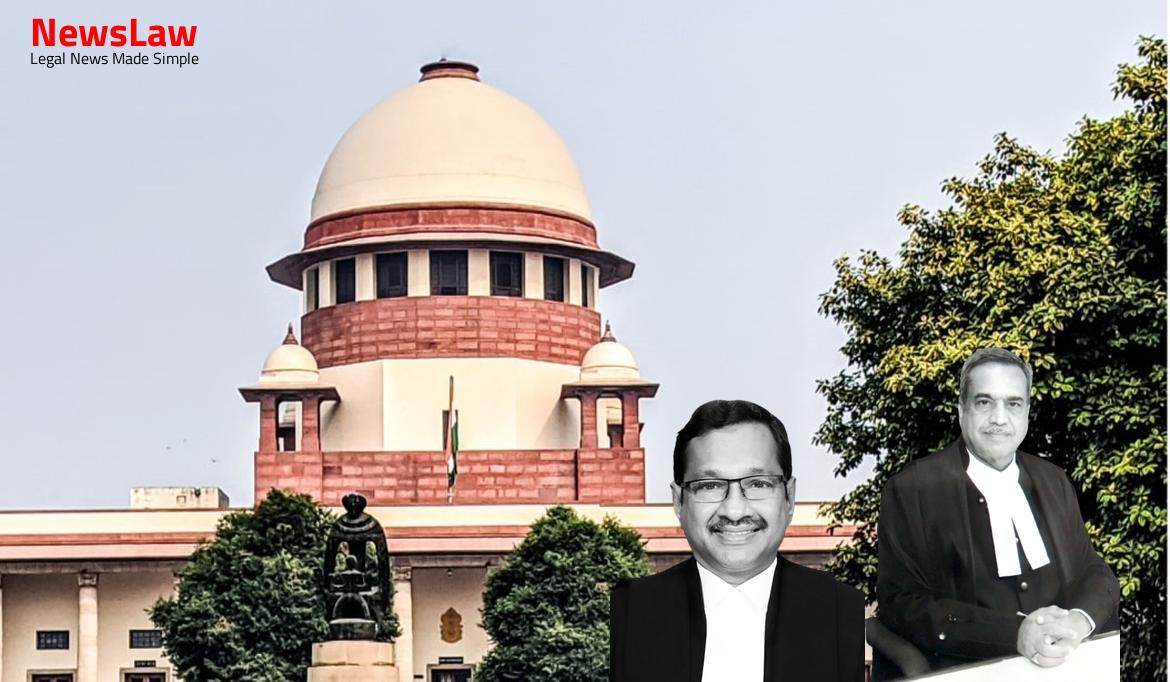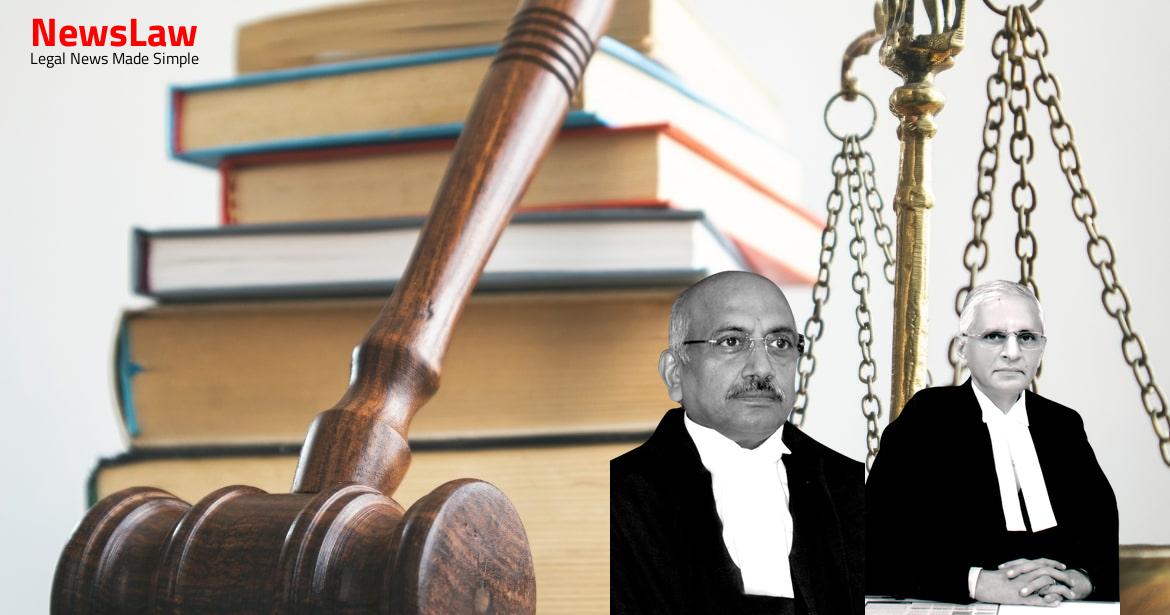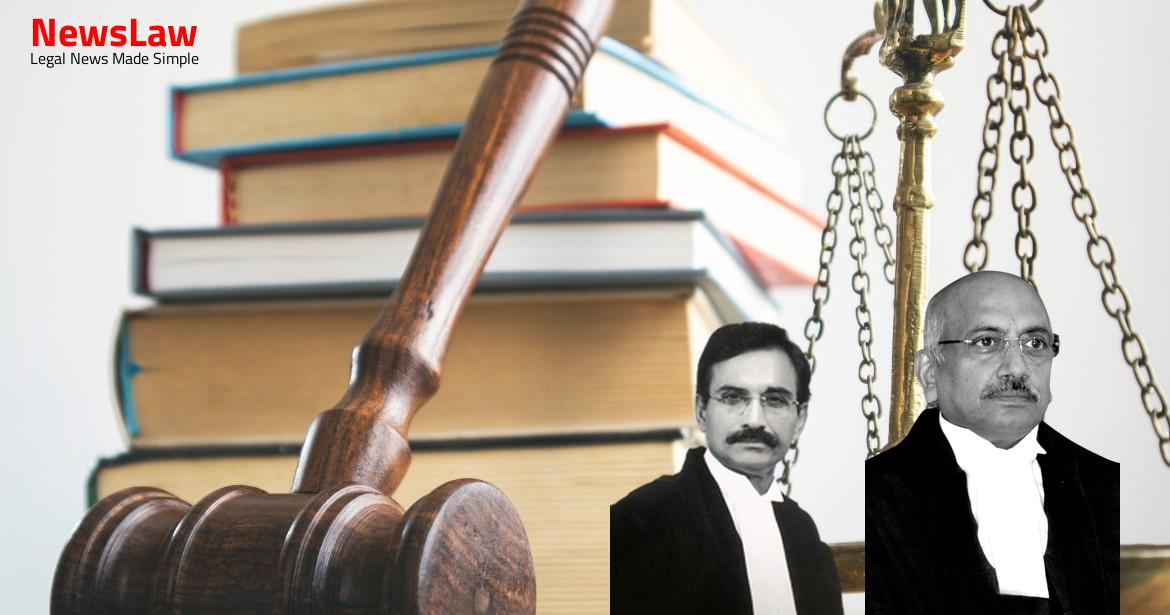The legal analysis in this case focuses on the delicate balance between minimal judicial intervention and the primacy of Committee of Creditors (CoC) decisions within the Insolvency and Bankruptcy Code (IBC) framework. The court emphasizes the importance of upholding the commercial wisdom of the CoC without undue interference, ensuring timely completion of processes. Delve into the intricate aspects of CoC decision-making post-admission, particularly in cases of withdrawal under Section 12A of the IBC, as the courts navigate the fine line between oversight and respect for stakeholders’ assessments.
Facts
- CoC meetings held from October to December 2020 to consider Settlement Plan
- Final settlement proposal considered in 16th meeting on 18 January 2021
- Initial approval of Settlement Plan with 70.63% votes
- Request for consideration of Settlement Plan terms by appellant
- IDBI Bank Limited filed application under Section 7 of IBC, leading to CIRP initiation
- Resolution Plan submitted by M/s Royal Partners Investment Fund Limited with 60.90% votes not approved
- RP filed application seeking directions based on request of IARCL for Settlement Plan approval
- RP filed application for withdrawal of CIRP after Settlement Plan approval with 94.23% votes
- NCLT rejected application for withdrawal of CIRP and approval of Settlement Plan as Business Restructuring Plan
- Appellant filed settlement application under Section 60(5) of IBC for one-time settlement plan
- RP filed application for liquidation process initiation of Corporate Debtor
- The appeal was filed by the appellant challenging the dismissal of the appeals filed against the rejection of the application for withdrawal under Section 12A of the IBC.
- The appellant also challenged the dismissal of the appeal against the order directing initiation of liquidation proceedings in respect of the Corporate Debtor.
- The main question to be considered is whether the NCLT or NCLAT can review the commercial wisdom of the Committee of Creditors in this case.
Also Read: Presumption of Genuine Endorsements in Cheque Case
Arguments
- Dr. Abhishek Manu Singhvi, learned Senior Counsel represented the appellant.
- The appeals could have been allowed as uncontested.
- Shri Abhishek Swaroop, counsel for respondent No.2 did not contest the matter.
- Dr. Singhvi emphasized that the authority cannot challenge the commercial wisdom of CoC.
- Dr. Singhvi argues that the main aim of the IBC is to allow the Corporate Debtor to continue operating while paying off the creditors as much as possible.
- He asserts that the CoC approved the Settlement Plan with a significant majority of 94.23% but the NCLT and NCLAT erred in rejecting it.
- Dr. Singhvi claims that the decisions of the NCLAT and NCLT go against the spirit of the IBC.
- Reference is made to Section 12A of the IBC which allows for the withdrawal of an application admitted under Section 7, 9 or 10.
Also Read: Medical Negligence and Compensation: A Landmark Decision
Analysis
- The Court has emphasized the importance of minimal judicial interference by NCLAT and NCLT in the framework of IBC.
- The Commercial wisdom of the CoC has been given paramount status without judicial intervention, ensuring completion of processes within IBC timelines.
- Financial creditors are assumed to be informed about the viability of the debtor and resolution plans, acting on expert assessments.
- The provision under Section 12A of the IBC requires a higher voting threshold of 90% for withdrawal compared to 66% for approval of Resolution Plans.
- The decision to allow withdrawal post-admission is based on CoC commercial wisdom and stakeholders’ collective assessment of viability.
- NCLT and NCLAT can overturn CoC decisions if found capricious, arbitrary, or de hors the provisions of the statute or rules.
- Recommendations of the Insolvency Law Committee led to the amendment in IBC for the provision of withdrawal with 90% CoC approval.
- Section 12A of the IBC was introduced to address exceptional circumstances allowing withdrawal post-admission with 90% CoC approval.
- The decision-making process of CoC for withdrawal needs to consider the negotiation process involving all creditors, and their liabilities must be met in any negotiated solution.
- Rule 11 of the National Company Law Tribunal Rules, 2016 may not be adopted for this aspect of CIRP at this stage.
- The Supreme Court in the case of Uttara Foods and Feeds Private Limited v. Mona Pharmacem observed that Rule 11 may not be applicable.
- The issue can be specifically addressed by amending rule 8 of the CIRP Rules.
- The Banking Law Reforms Committee Report emphasizes that all creditors willing to restructure their liabilities should be part of the negotiation process.
- Judicial permission for withdrawal of CIRP has been granted in cases of settlement between the applicant creditor and the corporate debtor.
- An application for withdrawal under Section 12-A may be made to the Adjudicating Authority before the constitution of the committee by the applicant through the interim resolution professional.
- After the constitution of the committee, the application for withdrawal may be made by the applicant through the interim resolution professional or the resolution professional.
- If the application is made after the issue of invitation for expression of interest under Regulation 36-A, the applicant must provide reasons justifying withdrawal at that stage.
- IBC was introduced to overhaul the insolvency and bankruptcy regime in India.
- The legislation is carefully considered and well thought out.
- The legislature amends the IBC constantly based on experience to ensure its efficacy.
- Judicial intervention or innovation from NCLT and NCLAT should be minimal and should not disturb the foundational principles of the IBC.
- Caution is given to NCLT and NCLAT against judicially interfering in the framework envisaged under the IBC.
Also Read: Remand of Writ Petition for Restoration and Decision on Merits
Decision
- The appeals are allowed
- The impugned judgment dated 28 January 2022 by the NCLAT and orders dated 12 August 2021 by the NCLT are quashed
- The application for withdrawal of CIRP filed by the Resolution Professional is allowed
Case Title: VALLAL RCK Vs. M/S SIVA INDUSTRIES AND HOLDINGS LIMITED (2022 INSC 636)
Case Number: C.A. No.-001811-001812 / 2022



